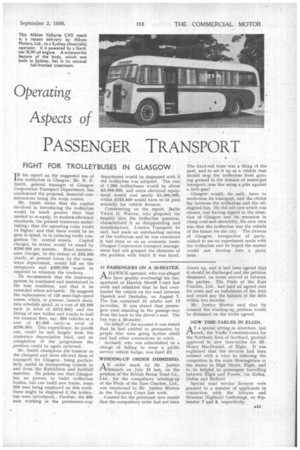Operating Aspects o PASSENGER TRANSPORT
Page 53

If you've noticed an error in this article please click here to report it so we can fix it.
FIGHT FOR TROLLEYBUSES IN GLASGOW
I N his report on the suggested use of
the trolleyhus in Glasgow, Mr. R. F. Smith, general manager of Glasgow Corporation Transport Department, has condemned the proposal, financial considerations being the main reason.
Mr. Smith states that the capital involved in introducing the trolleybus would be much greater than that needed to re-equip, to modern efficiency standards, the present tramways undertaking: that the operating costs would be higher; and that there would be no gain in speed, or in reducing traffic con
gestion •in central streets. Capital charges, he states, would be raised by £295,000 per annum. Road maintenance charges, to the extent of £92,300 yearly, at present borne by the tramways department, would fall on the ratepayers and £489,988 would be required to reinstate the roadway.
. He recommends that the tramways System be continued and maintained in the best condition, and that it be extended where advisable. He suggests the replacement of 125 semi-high-speed trams, which, at present, cannot maintain schedule speed, at a cost of £2,500 each (a total of £312,500) and the fitting of new bodies and trucks to half the tramcar fleet, say, 500 vehicles at a cost of £1,500 each—a total of £750,000. This expenditure, he points .out, could be met largely from the tramways depreciation fund, and on completion of the programme the position could be again reviewed.
Mr. Smith champions the tramcar as the cheapest and most efficient form of transport for Glasgow, being particularly useful in transporting crowds to and from the Exhibition and football matches. He points out that Glasgow has no powers to build trolleybus bodies, but can build new trams, some 200 men being employed on this work: these might be displaced if the trolleybus were introduced.. Further, the 800 men working in the permanent-way department would be dispensed with if the trolleybus was adopted. The cost of 1,200 trolleybuses would be about £3,000,000, and extra electrical equipment would cost nearly £1,000,000, whilst £123,840 would have to be paid annually for vehicle licences.
Commenting on the report, Bailie Victor D. Warren, who proposed the inquiry into the trolleybus question, characterized it as disappointing and unsatisfactory. London Transport, he said, had made an outstanding success. of the trolleybus and be was convinced it had done so on an economic basis: Glasgow Corporation transport management had not grasped the elements of the problem with which it was faced. The fixed-rail tram was a thing of the past, and to set it up as a vehicle that should stop the trolleybus from gaining ground in the domain of municipal transport, was like using a pike against a field-gun!
Glasgow would, he said, have to modernize its transport, and the choice lay between the trolleybus and the oilengined bus. He did not care which was chosen, but having regard to the situation of Glasgow and its resources in cheap coal and electricity, his own view was that the trolleybus was the vehicle of the future for the city. The citizens of Glasgow, irrespective of party, wished to see an experiment made with the trolleybus and he hoped the matter would not develop into a party issue.




















































































